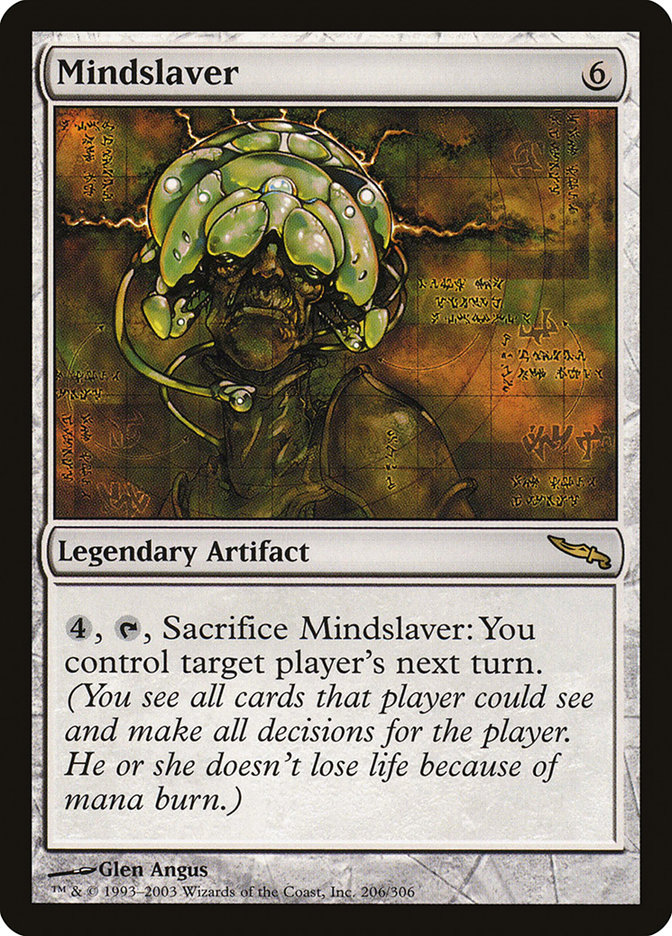
Mindslaver {6}
Legendary Artifact
{4}, {T}, Sacrifice Mindslaver: You control target player during that player’s next turn. (You see all cards that player could see and make all decisions for the player.)
Illustrated by Glen Angus
- Standard
- Not Legal
- Alchemy
- Not Legal
- Pioneer
- Not Legal
- Explorer
- Not Legal
- Modern
- Legal
- Historic
- Legal
- Legacy
- Legal
- Brawl
- Legal
- Vintage
- Legal
- Timeless
- Legal
- Commander
- Legal
- Pauper
- Not Legal
- Oathbreaker
- Legal
- Penny
- Legal
Toolbox
Buy This Card
Notes and Rules Information for Mindslaver:
- The player you're controlling is still the active player during that turn. (2024-04-12)
- You could gain control of yourself using Mindslaver, but gaining control of yourself doesn't really do anything. (2024-04-12)
- You only control the player. You don't control any of that player's permanents, spells, or abilities. (2024-04-12)
- While controlling another player, you also continue to make your own choices and decisions. (2024-04-12)
- While controlling another player, you make all choices and decisions that player is allowed to make or is told to make during that turn. This includes choices about what spells to cast or what abilities to activate, as well as any decisions called for by triggered abilities or for any other reason. (2024-04-12)
- You can't make the affected player concede. That player may choose to concede at any time, even while you're controlling that player. (2024-04-12)
- You can't make any illegal decisions or illegal choices—you can't do anything that player couldn't do. You can't make choices or decisions for that player that aren't called for by the game rules or by any cards, permanents, spells, abilities, and so on. If an effect causes another player to make decisions that the affected player would normally make (such as Master Warcraft does), that effect takes precedence. In other words, if the affected player wouldn't make a decision, you wouldn't make that decision on that player's behalf. (2024-04-12)
- You also can't make any choices or decisions for the player that would be called for by the tournament rules (such as whether to take an intentional draw or whether to call a judge). (2024-04-12)
- You can use only the affected player's resources (cards, mana, and so on) to pay costs for that player; you can't use your own. Similarly, you can use the affected player's resources only to pay that player's costs; you can't spend them on your costs. (2024-04-12)
- If the targeted player skips their next turn, you'll control the next turn the affected player actually takes. (2024-04-12)
- Multiple player-controlling effects that affect the same player overwrite each other. The last one to be created is the one that works. (2024-04-12)
- While controlling another player, you can see all cards in the game that player can see. This includes cards in that player's hand, face-down cards that player controls, and any cards in that player's library the player may look at. (2024-04-12)
- Controlling a player doesn't allow you to look at that player's sideboard. If an effect instructs that player to choose a card from outside the game, you can't have that player choose any card. (2024-04-12)
- In a Two-Headed Giant game, gaining control of a player causes you to gain control of each player on that team. (2024-04-12)